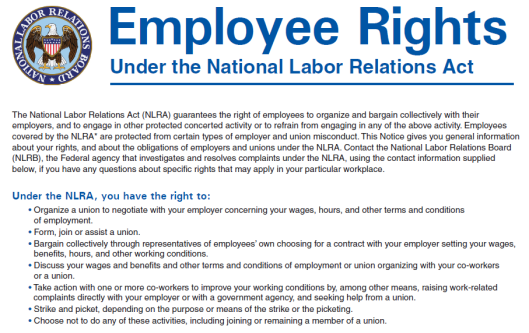Tags
Employees Rights to Join a Security Union, How to Join a Security Guard Union, Join a Security Guard Union, LAW ENFORCEMENT OFFICERS SECURITY UNION, Law Enforcement Officers Security Unions, LEOSU, National Labor Relations Act, NLRA, Rights of Employees, Security Guard, Security Guard Labor Union, Security Guard Rights, Security Guard Unions, Security Union, Union, Union for Security Guards, Union for Security Officers
THE LAW SAYS YOU HAVE A RIGHT TO JOIN A LAW ENFORCEMENT OFFICERS SECURITY UNION
Examples of employer conduct that violates the law:
Threatening employees with loss of jobs or benefits if they join or vote for a union or engage in protected concerted activity.
Threatening to close the plant if employees select a union to represent them.
Questioning employees about their union sympathies or activities in circumstances that tend to interfere with, restrain or coerce employees in the exercise of their rights under the Act.
Promising benefits to employees to discourage their union support.
Transferring, laying off, terminating, assigning employees more difficult work tasks, or otherwise punishing employees because they engaged in union or protected concerted activity.
Transferring, laying off, terminating, assigning employees more difficult work tasks, or otherwise punishing employees because they filed unfair labor practice charges or participated in an investigation conducted by NLRB.
Rights of Employees
Sec. 7. [§ 157.] Employees shall have the right to self-organization, to form, join, or assist labor organizations, to bargain collectively through representatives of their own choosing, and to engage in other concerted activities for the purpose of collective bargaining or other mutual aid or protection, and shall also have the right to refrain from any or all of such activities except to the extent that such right may be affected by an agreement requiring membership in a labor organization as a condition of employment as authorized in section 8(a)(3) [section 158(a)(3) of this title].
What rules govern collective bargaining for a contract?
After employees choose a union as a bargaining representative, the employer and union are required to meet at reasonable times to bargain in good faith about wages, hours, vacation time, insurance, safety practices and other mandatory subjects. Some managerial decisions such as subcontracting, relocation, and other operational changes may not be mandatory subjects of bargaining, but the employer must bargain about the decision’s effects on unit employees.
It is an unfair labor practice for either party to refuse to bargain collectively with the other, but parties are not compelled to reach agreement or make concessions.
IT’S ALWAYS wise to take full advantage of YOUR LEGAL RIGHTS.
WITH A UNION, the employer must bargain and pay the wages negotiated.
WITH A UNION, your rights on the job are spelled out and must be respected.
WITH A UNION, you can stop abuses on the job. The union can prevent unjust and unfair treatment by giving you representation on the job and the right to file grievances if you are treated unfairly.
WITH A UNION, you can negotiate for better holiday pay, vacations, health and welfare benefits, and job conditions.
WITH A UNION, you have greater security on your job. Company management cannot fire you without good reason and they must respect your length of service if there are layoffs.
WHAT ARE YOUR RIGHTS?
It is unlawful for your employer or supervisor to interfere with, restrain or coerce employees seeking to organize or join a union.
What employers and supervisors can NOT do:
1) They CANNOT tell employees that the Employer will fire or punish them if they engage in union activity.
2) They CANNOT lay off or discharge any employee for union activity
3) They CANNOT grant employees wage increases or special concessions in order to keep the union out.
4) They CANNOT bar employee union representatives from talking with members during non-working hours.
5) They CANNOT ask employees about confidential union matters, meetings, etc.
6) They CANNOT ask employees about the union or about union representatives.
7) They CANNOT ask employees how they intend to vote.
8) They CANNOT ask employees whether or not they belong to a union or have signed up for a union.
9) They CANNOT by the nature of the work assignment, create conditions intended to get rid of an employee because of his or her union activity.
10) They CANNOT threaten workers or coerce them in an attempt to influence their vote.
11) They CANNOT tell employees that existing benefits will be discontinued if the institution is unionized. )
12) They CANNOT say unionization will force the employer to lay off workers.
13) They CANNOT say unionization will take away vacations or other benefits and privileges presently in effect.
14) They CANNOT promise employees promotions, raise or other benefits if they get out of the union or refrain from joining it.
Any of the above acts constitutes a violation of the National Labor Relations Act.

Organizing: 1-800-516-0094
United Federation LEOS-PBA (202) 595-3510

